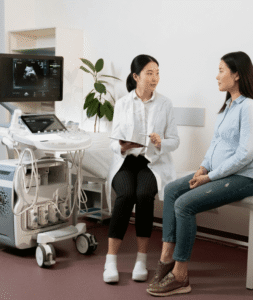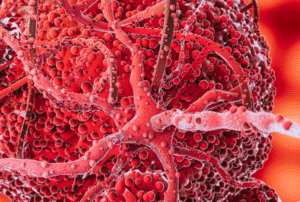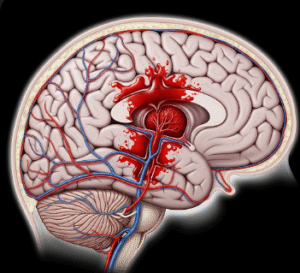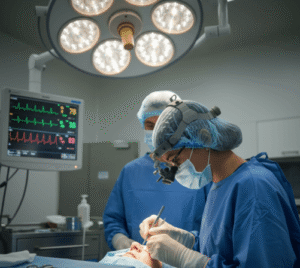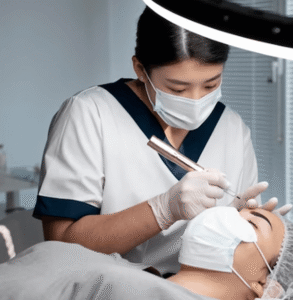Overview
Acid Sphingomyelinase Deficiency (ASMD), previously known as Niemann-Pick disease types A and B, is a rare, inherited lysosomal storage disorder. It results from a deficiency of the acid sphingomyelinase (ASM) enzyme, which leads to the harmful buildup of sphingomyelin and other lipids in various organs. ASMD can affect the liver, spleen, lungs, and brain, causing a range of symptoms that vary in severity depending on the subtype. It is a progressive condition, and early diagnosis is essential for disease management.
What is Acid Sphingomyelinase Deficiency?
ASMD is a genetic disorder caused by mutations in the SMPD1 gene, which encodes the enzyme acid sphingomyelinase. This enzyme helps break down a fatty substance called sphingomyelin. When ASM is missing or malfunctioning, sphingomyelin accumulates inside cells, particularly in the liver, spleen, lungs, bone marrow, and nervous system.
ASMD is classified into several types:
- Type A (Infantile Neurovisceral ASMD): Severe and rapidly progressive, usually fatal in early childhood.
- Type B (Chronic Visceral ASMD): Milder form with little or no neurological involvement; patients may live into adulthood.
- Intermediate Type (A/B): Features of both type A and B, with variable neurological involvement and life expectancy.
Symptoms
Symptoms vary by ASMD type and severity but may include:
Type A (Infantile Form):
- Enlarged liver and spleen (hepatosplenomegaly)
- Feeding difficulties
- Failure to thrive
- Developmental delays
- Loss of motor skills
- Seizures
- Cherry-red spot in the eye
- Severe neurological deterioration
- Death usually occurs by age 2–3
Type B (Chronic Form):
- Enlarged liver and spleen
- Low platelet count (thrombocytopenia)
- Frequent nosebleeds or bruising
- Lung disease (interstitial lung disease)
- Growth delays or short stature
- Delayed puberty
- Bone pain or fractures
- Mild learning difficulties (occasionally)
Intermediate (A/B) Type:
- Combination of visceral and neurological symptoms
- Variable life expectancy
Causes
ASMD is caused by mutations in the SMPD1 gene on chromosome 11. These mutations impair or eliminate the activity of acid sphingomyelinase, leading to the accumulation of sphingomyelin in cells and tissues.
- Inheritance pattern: Autosomal recessive (both parents must carry a defective copy of the gene)
Risk Factors
- Family history of ASMD or Niemann-Pick disease
- Ashkenazi Jewish ancestry (higher carrier frequency for type A)
- Consanguinity (genetic relation between parents)
There are no known environmental or lifestyle factors that influence the risk, as ASMD is strictly genetic.
Complications
- Severe respiratory disease (especially in type B)
- Progressive liver failure
- Infections due to low immunity or lung damage
- Severe neurological deterioration (in type A)
- Early death (in infantile form)
- Reduced quality of life due to chronic symptoms and organ dysfunction
Prevention
There is no way to prevent ASMD in individuals already born with the disease, but genetic counseling and testing can help at-risk families:
- Carrier testing for couples with a family history
- Prenatal testing during pregnancy (via chorionic villus sampling or amniocentesis)
- Preimplantation genetic diagnosis (PGD) for IVF pregnancies
Treatment Options Korea
1. Enzyme Replacement Therapy (ERT)
- Olipudase alfa (Xenpozyme)
- Approved in some countries for non–CNS-involved ASMD (types A/B and B)
- May be available in Korea under expanded access or compassionate use at major hospitals
2. Supportive Care
- Liver and spleen monitoring
- Pulmonary support (e.g., oxygen, bronchodilators)
- Nutritional support and growth tracking
- Physical therapy to maintain mobility
3. Management of Neurological Symptoms (Type A)
- No cure currently for severe infantile neurodegenerative type (Type A)
- Palliative care and symptom management only
4. Genetic Counseling
- For families with ASMD history
- Available through major Korean medical centers and prenatal screening programs



